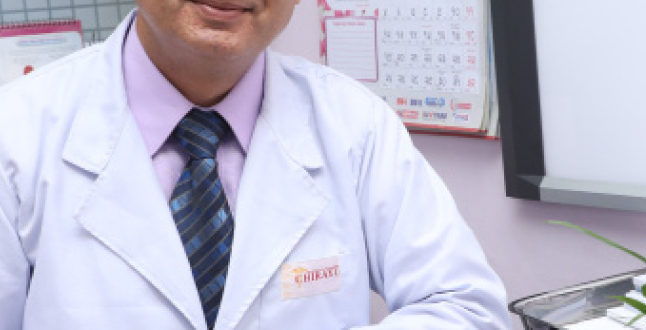
Prof. Dr. Uttam Kumar Sharma
Urologist & Kidney Transplant Surgeon
“I think that the government should set up one renal transplant center in every province, and for this, the existing facilities of medical colleges could be used.”
His very presence is soothing, he being a man who exudes modesty and calm. And once you realize that he is one of the pioneering urologist surgeons in Nepal, having being part of the elite team that did the very first renal transplant way back on August 8, 2008, at TU Teaching Hospital, you feel comforted that we have such a capable doctor in our midst.
Your comfort further increases when you know that that current Prime Minster K. P. Oli had enough confidence to have a renal transplantation done right here in Nepal some months back, putting complete trust in the capable hands of Prof. Dr. Uttam Kumar Sharma and his team of capable surgeons. Yes indeed, it is very comforting to know that Prof. Dr. Uttam Kumar Sharma, MS, FICS, is at the peak of his abilities and that his services are available to one and all. Besides being HOD of the Department of Urology at TU Teaching Hospital, he is Medical Director and Senior Consultant Urologist & Kidney Transplant at Chirayu National Hospital and Medical Institute in Basundhara, Kathmandu. We talked to him about work in his field of specialization and associated subjects.
To the question of how the standard of medical education has changed in Nepal since he did is MS from TUTH in 1999, his answer was succinct: “There is vast difference now from those days. There were few trained personnel who delivered on education, research work, and medical culture, which we had to mostly do ourselves. There was also no definitive structural program like these days, something that we have developed over a period of time. Later, we formulated the highest level of urological training, which has proven that all is at par with other urological colleagues around the neighboring countries. Nowadays, we are having conferences, particularly on urological problems, which was also not available in those days.”
 Delving further, I asked:
Delving further, I asked:
Nowadays, more doctors are produced within the country due to the significant increase in number of medical colleges, how do see this affecting quality of healthcare?
Well, as I see it, there are both positive and negative aspects. On the positive side, now students do not have to go abroad, like I had to for my MBBS, which I did in Bangladesh. This will save a lot of money from going out of the country, and since they will be studying in their own country, they will get a better understanding of the local problems regarding healthcare and how to deal with them.
On the negative side, because some may be pressured, instead of having the aptitude, to study medicine, and it costs a lot of money, there may be pressure later on to recover the same, which certainly can have bad results. Moreover, because of more diffusive competition for seats, as compared to greater competition before, not all who pass may have the same ability. And, as you know, when corporate houses are involved, the rate of return gains added importance. However, at the end of it all, we all are judged by our patients and peers later on.
To the question of how he became a surgeon, he says with a nostalgic smile:
When I was doing my MBBS in Bangladesh, one of my professors commented that perhaps I would want to be a famous physician someday, to which I replied without hesitation that what I wanted to be was a surgeon. I loved to dissect cadavers, which most of the Bangladeshi students abhorred doing. I recall very clearly that it was when I was in my third year that I decided to become a urologist. As far as the qualities essential to a surgeon are concerned, I believe it consists of three things: first, you have to have the ability to set-up your mind, just like a computer does; second, you have to have excellent hand, eye, and mind coordination; and third, you have to have a lot of physical stamina.
How big is the problem of urological diseases in Nepal?
Very big, and more so in the case of women, because they are inhibited and reluctant to come forward. For instance, urinary incontinence is a very embarrassing problem for them. Similarly, we are ignoring the older generation with regard to this particular issue; many of them literally lie in urine-soaked bed sheets for long periods of time. I think awareness programs are the need of the hour, besides taking the help of local health workers who can take them to nearby health centers for treatment.
What about prostate gland problems (benign prostatic hyperplasia-BPH) and ED that we hear are very common, as well?
Yes, it is commonly seen in men over fifty. After 50, the prostate begins to enlarge, with symptoms being decrease in urine flow, increase in the urge to urinate, difficulty in holding urine, and difficulty/delay in voiding urine. But, there are medicines to treat this common problem. We mostly use alpha blockers that decrease the enlarged prostate’s size and relieve the symptoms. Fortunately, prostate cancer seems to be less prevalent in South Asian countries than elsewhere, although it could also be due to less detection opportunities. Another common problem is erectile dysfunction (ED), which is also something that people are reluctant to come forward with. However, while there are medicines to treat ED, it should be noted that it may be an indication of cardiac disease, so my advice is that those who have ED should go in for a cardiac evaluation, as well.
You received your license for renal transplant in 2008, and the first renal transplants were done in 2008. Were you a part of the pioneering transplant team? Who else was in the team?
I remember it was the opening day of the Beijing Olympics, August 8, 2008, when we did the first renal transplant in Nepal. The patient was a 37-year-old man, with the donor being his wife. The transplant team was led by Dr. Bhola Raj Joshi and had Dr. Gun Kumar Shrestha and Dr. Prem K. Gyawali besides myself and an Australian, Dr. David Francis. The operation was done in collaboration with an Australian team. The transplant outcome was successful, although it was a big challenge in terms of logistics, and the outcome was uncertain, since at the time, there were reports from around the world of many transplant patients dying after the operation. .
In your more than decade-long career as a renal transplant surgeon, how many transplants have you done? And, although all transplants are challenging, are there any cases that you particularly remember?
I have been involved in 600-700 renal transplants till now, leading almost half of them myself. The outcome has been comparable to Western countries. Well, as far as renal transplants go, all transplants are equally challenging; something could happen on the table during the operation itself, or after an hour, one cannot say. Early/acute rejection has been seen in about five percent of the transplants, but they can be tackled. Other urological and nephrological problems are also seen, but they too can be tackled.
Apparently, the mortality prognosis is quite good after renal transplants, what is the age of the oldest person living on whom you have done a transplant?
Yes, the mortality rate has been very good. Of the first 10 renal transplants done in Nepal, the oldest recipient is 68 years old now, and doing very well.
Prime Minister K.P. Oli had his second renal transplant in March last year at TUTH, how has been his recovery?
First of all, I must say a big thank you to the prime minister for his confidence in us to do such a big operation here in Nepal itself. As for his outcome, you can see for yourself! He seems to be more vital than before, facing so many challenges with so much vigor. Yes, I would say the outcome has been very good.
There are regular technological advances in the field of urology, how much do you use them in your field of specialization?
When I first started practice, there was very limited technology. While 70% of knowledge and 30% of technology is an ideal combination, today it is just the reverse. Nowadays, we do most urological procedures using the latest endo-urology techniques, such as percutaneous approach through the loin and lithotripsy. In 2000, 70% of cases used to be open surgeries, and only 30% were done through endo-urology procedure; today 90% of stone surgeries are done through endo-urology procedure. About 10% are done using combined therapy. Today, advanced imaging technology also helps us to have a clearer and more specific picture of the disease status, thus helping in better diagnosis. We are quite well equipped with new technology now, except for robotics. Here, I must add that ultrasound is still the gold standard for an urologist, and I believe that every urologist should have an ultrasound unit in his/her clinic. I would say it is like a stethoscope to a physician.
How prevalent is the need for renal transplants in Nepal, and if there is a significant shortfall, what needs to be done on a priority basis to increase the number of transplants?
Certainly, there is need for more renal transplants, since cases of renal failures are many, and having a transplant is better than living on dialysis for such patients. Quality of life is better, and in the long run, money is saved, as well. However, we have low number of trained human resource, and renal transplants also require multispecialty facilities with supporting services. Currently, we are aiming to produce at least two trained urologists every year at TUTH. Another thing is that, the donor pool should be expanded to include brain dead patients and cadavers, as well as altruistic donors. However, to prevent the commercialization of kidney donations, this should be done under strict government supervision. I also think that the government should set up one renal transplant center in every province, and for this, the existing facilities of medical colleges could be used.
There are many drugs now to treat urological diseases, and many of them are being manufactured by Nepali pharma companies. How satisfied are you with the domestic manufacturers regarding quality?
I would like to support and encourage the domestic pharmaceutical industry, but at the same time, I would suggest that they follow strict protocols to ensure standardization along international standards. I generally wait and watch for some time before prescribing new products.
 Medicosnext
Medicosnext




